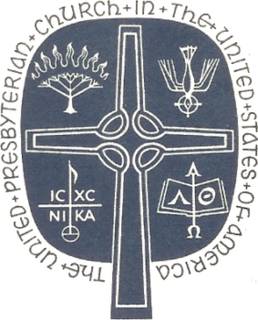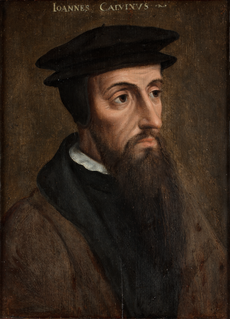Related Research Articles

The Presbyterian Church (USA), abbreviated PC(USA), is a mainline Protestant denomination in the United States. It is the largest Presbyterian denomination in the US, and known for its relatively progressive stance on doctrine and ordains women and LGBT community as elders and ministers. The PC(USA) was established by the 1983 merger of the Presbyterian Church in the United States, whose churches were located in the Southern and border states, with the United Presbyterian Church in the United States of America, whose congregations could be found in every state. The similarly named Presbyterian Church in America is a separate denomination whose congregations can also trace their history to the various schisms and mergers of Presbyterian churches in the United States. Unlike the PCA, the PC(USA) supports evangelical feminism and supports practise of same gender marriages. It also welcomes gay and lesbian persons to serve in leadership positions as ministers, deacons, elders, and trustees.
Presbyterianpolity is a method of church governance typified by the rule of assemblies of presbyters, or elders. Each local church is governed by a body of elected elders usually called the session or consistory, though other terms, such as church board, may apply. Groups of local churches are governed by a higher assembly of elders known as the presbytery or classis; presbyteries can be grouped into a synod, and presbyteries and synods nationwide often join together in a general assembly. Responsibility for conduct of church services is reserved to an ordained minister or pastor known as a teaching elder, or a minister of the word and sacrament.

The Presbyterian Church in America (PCA) is the second-largest Presbyterian church body, behind the Presbyterian Church (USA), and the largest conservative Calvinist denomination in the United States. The PCA is Calvinist in theology and presbyterian in government. It is characterized by a blend of Calvinist practice and broad evangelicalism.

The Presbyterian Church in the United States was a Protestant denomination in the Southern and border states of the United States that existed from 1861 to 1983. That year, it merged with the United Presbyterian Church in the United States of America (UPCUSA) to form the Presbyterian Church (USA).

The United Presbyterian Church in the United States of America (UPCUSA) was the largest branch of Presbyterianism in the United States from May 28, 1958, to 1983. It was formed by the union of the Presbyterian Church in the United States of America (PCUSA), often referred to as the "Northern" Presbyterian Church, with the United Presbyterian Church of North America (UPCNA), a smaller church of Covenanter-Seceder tradition at a conference in downtown Pittsburgh, Pennsylvania, in May 1958. Vigorous ecumenical activity on the part of PCUSA leaders led to this merger, something of a reunion of two long-separated branches of the larger Presbyterian family deriving from the British Isles.

The Evangelical Presbyterian Church (EPC) is an American church body holding to presbyterian governance and Reformed theology. It is most distinctive for its approach to the way it balances certain liberties across congregations on "non-essential" doctrines, such as egalitarianism in marriage or the ordination of women, alongside an affirmation of core "essential" doctrinal standards.

The Presbyterian Church in Canada is a Presbyterian denomination, serving in Canada under this name since 1875. The United Church of Canada claimed the right to the name from 1925 to 1939. According to the Canada 2001 Census 409,830 Canadians identify themselves as Presbyterian, that is, 1.4 per cent of the population.

The Confession of 1967 is a confession of faith of the Presbyterian Church (U.S.A.), abbreviated PC(USA). It was written as a modern statement of the faith for the United Presbyterian Church in the United States of America (UPCUSA), the "northern church", to supplement the Westminster Confession and the other statements of faith in its new Book of Confessions.

The United Presbyterian Church of North America (UPCNA) was an American Presbyterian denomination that existed for one hundred years. It was formed on May 26, 1858 by the union of the Northern branch of the Associate Reformed Presbyterian Church with the Associate Presbyterian Church (Seceders) at a convention at the Old City Hall in Pittsburgh. On May 28, 1958, it merged with the Presbyterian Church in the United States of America (PCUSA) at a conference in Pittsburgh to form the United Presbyterian Church in the United States of America (UPCUSA).

The moderator of the General Assembly is the chairperson of a General Assembly, the highest court of a Presbyterian or Reformed church. Kirk sessions and presbyteries may also style the chairperson as moderator. The Oxford Dictionary states that a Moderator may be a "Presbyterian minister presiding over an ecclesiastical body".
The Reformed Presbyterian Church, Evangelical Synod was a Reformed and Presbyterian denomination in the United States and Canada between 1965 and 1982.
The General Assembly of the Presbyterian Church (U.S.A.) adopted a policy of "phased, selective divestment" from certain American corporations operating in Israel beginning in 2004, as a means of influencing the government of Israel. This policy has been controversial both within and outside of the denomination, even resulting in charges of antisemitism. The policy was changed in 2006 by another vote of the General Assembly.
The following is a list of synods and presbyteries that composed the former United Presbyterian Church in the United States of America on December 31, 1968. The UPCUSA was the largest body, often erroneously referred to as "Northern," of Presbyterianism in the U.S., prior to its 1983 merger with the Presbyterian Church in the United States, whose churches were located entirely within the Southern and border states.
The Reformed Presbyterian Church - Hanover Presbytery is a very conservative Protestant, Presbyterian denomination, founded in 1991, with congregations in United States and also in Brazil.

Presbyterianism has had a presence in the United States since colonial times and has exerted an important influence over broader American religion and culture.
Edler Garnet Hawkins (1908–1977) was a Presbyterian minister from New York City. He is known for his ecumenical work and for being the first African American to serve as Moderator of the General Assembly for the United Presbyterian Church in the United States of America.
References
- ↑ Proceedings of the 218th (2008) General Assembly, Presbyterian Church (U.S.A.), p. 1484